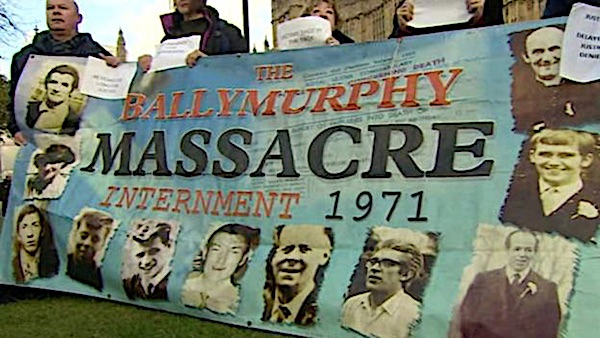
A British MP has warned that new recruits could be deterred from joining the British Army because of the possibility of prosecution for war crimes.
Ruth Smeeth made the claim when she spoke in favour of an amnesty for British soldiers who were responsible for killing civilians in Ireland. The MP for Stoke said: “Our brave service personnel were acting under orders; we asked them to do many things for us; we need to have their backs.”
The concept of an amnesty has gained support among Westminster backbenchers, who have depicted prosecutions of former British soldiers are a “witch-hunt”.
An amnesty bill, if passed, would effectively close off investigations into how British forces carried out state killings and colluded in state-sanctioned attacks through unionist death squads.
Among those present for the debate were relatives of 10 people killed by soldiers in the Ballymurphy massacre.
John Teggart, who lost his father, said the discussion had been “one sided”.
“You can’t debate an issue when they are all singing off the same hymn sheet,” he said. “I am not happy; the voice of victims was left sitting in the public gallery.”
Sinn Fein’s Chris Hazzard accompanied the victims’ families to London. He said: “There must be no immunity for people who have killed Irish citizens. A fundamental democratic principle is equality under the law, and this proposal runs entirely contrary to that.”
Sinn Fein’s Gerry Kelly was also adamant that an amnesty for British soldiers cannot be part of any resolution on dealing with the legacy of the conflict.
“Everyone needs to be equal under the law, and there can be no immunity for people who have killed Irish citizens,” he said.
“That is a basic principle and the DUP were adamant during negotiations that there should be no amnesties, despite the fact that two of their MPs have decided to support the statute of limitations.
“The way forward on legacy is not through self-serving and selective amnesties. It is in the implementation of the mechanisms of the Stormont House Agreement.
“In that agreement, all parties endorsed legacy mechanisms which should have been operational long before now.
“The reason they aren’t is because they have been blocked by the British government which is still refusing to honour its commitments under the Stormont House Agreement and to abide by their international obligations to victims.”
In a statement, Amnesty International called for the government to reject any moves to legislate for a statute of limitations.
Grainne Teggart, the charity’s campaigns manager, said: “All victims of human rights violations and abuses from Northern Ireland’s conflict have a right to an independent investigation, with the possibility of prosecutions to follow where the evidence leads.
“This is true, whatever the identity of the victim and whatever the identity of the perpetrator. To remove this recourse would be a betrayal of victims’ fundamental right to justice.”
![[Irish Republican News]](https://republican-news.org/graphics/title_gifs/rn.gif)
![[Irish Republican News]](https://republican-news.org/graphics/title_gifs/harp.gif)

